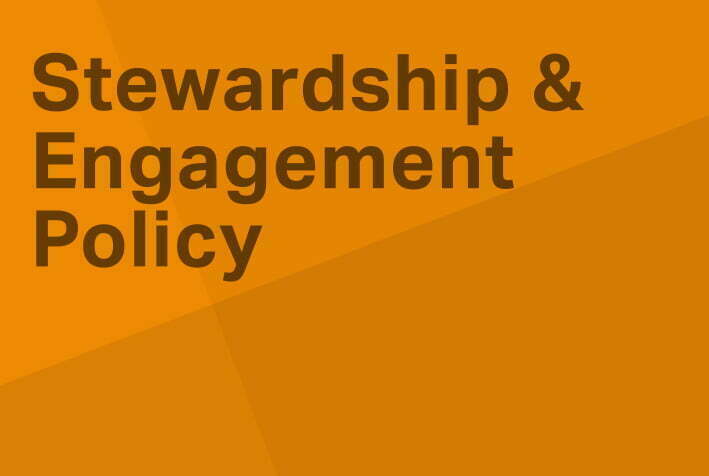Veritas Investment Partners (UK) Limited Stewardship and Engagement Policy
Introduction
Our stewardship activities are an integral part of our approach to sustainable investment and they contribute to our ability to deliver real returns for our clients over the long term.
Our investment process focuses on identifying companies with sustainable business models and cash flow generation. As our sole aim is to deliver long-term returns ahead of inflation for our clients, we will only invest in companies which our internal research indicates have strong fundamental characteristics, including good corporate governance structures. We believe that companies who have constructive and honest dialogue with active, well-informed shareholders are more likely to deliver superior financial performance in the long run. We therefore engage with companies in order to contribute to their long-term success.
Our stewardship activities include monitoring and engaging with companies on their strategy, financial performance, business practices, social and environmental risk management and opportunities, remuneration and corporate governance, as well as voting at company general meetings.
Our stewardship activities are overseen by our investment team.
Monitoring
Constant and effective monitoring of companies is an integral part of our investment process.
Our targeted approach means we typically hold between 25 and 40 companies, which we thoroughly evaluate prior to investing and continue to monitor on a regular basis once an investment has been made. We carry out in-depth research, using external information where appropriate, and we seek to have dialogue with all of our investments at least annually. Furthermore, we will always respond when companies write to us or request a meeting.
As part of our initial investment research and ongoing monitoring process, we consider the extent to which companies are:
- Setting strategic objectives that build a long-term sustainable business model and prioritising the achievement of these strategic objectives over short-term performance;
- Implementing high quality business practices;
- Managing risk effectively, as seen from the perspective of multiple stakeholders;
- Implementing an appropriate capital structure, through a process of sound capital allocation;
- Promoting good corporate governance, including strong corporate cultures and appropriate remuneration and incentives; and,
- Communicating transparently and producing high quality disclosures and reporting.
Engaging with companies
On initially investing in a company, we introduce ourselves in writing to the Chair of the Board outlining our investment strategy and approach to stewardship. This letter sets out what we expect of companies and w h a t they should expect from us.
Following investment, we engage with companies on issues which, if addressed, will further improve real returns over the long term and enhance the sustainability of their businesses. We seek to engage directly with company management, the Chair of the Board and other Board members. Engagement activity is escalated as required by the nature of the issues being raised and the response of company management and the Board to our dialogue.
Our engagements are undertaken in a spirit of partnership, whereby we work together with companies to bring about long-term positive change.
However, should there be a fundamental change to our investment case for a company, which we believe would put our clients’ capital at risk, then we would sell the holding rather than initiating a potentially lengthy engagement.
Tracking the progress of engagement
We monitor the progress of our engagements by setting ourselves clear objectives at the outset and measuring progress against four milestones:
- Raising the issue with the company;
- Receiving acknowledgement from the company that our concerns are valid;
- Receiving confirmation from the company that it is developing a plan to address the issue; and,
- Receiving confirmation from the company that the plan is implemented and the objective is delivered
Where we make insuffient progress on an engagement, we will reassess our options and may choose to sell our holding. When we choose to sell following an attempt at engagement, we inform the company in writing of our reasons for doing so.
Acting collectively with other investors
Where appropriate, we will engage with other investors to increase the probability of a good outcome for our clients. To facilitate collective engagement, we are members of the Principles for Responsible Investment.
Voting
Voting is an important means of communicating with companies and we exercise our right to vote. As with all of our stewardship activities, we seek to promote the long-term success of the companies in which we invest on behalf of our clients.Our approach to voting is set out in our Voting Policy, which is appended to this document.
Managing conflicts of interest
We seek to promote the long-term success of companies, including those with which we have a commercial relationship or where clients may have differing views on the outcome of a stewardship activity. In those limited circumstances, where a conflict over our approach to voting or engagement arises, the matter is escalated to our Investment Governance
Committee for resolution
We do not expect to receive price-sensitive or inside information in our engagements with companies. However, if this were ever to happen, we would handle the information according to our normal compliance policies and procedures.
Reporting
We provide our clients with an annual stewardship report, detailing our voting and engagement on their behalf. This report will also be publicly available on our website.Our report includes an overview of our record voting and, in line with the Shareholder Rights Directive II, detailed case studies of any significant votes. Given that we only make an investment when we are satisfied that appropriate governance structures are in place and we therefore typically expect to vote with company management, we define significant votes as those where we voted against company management.
01/2021
